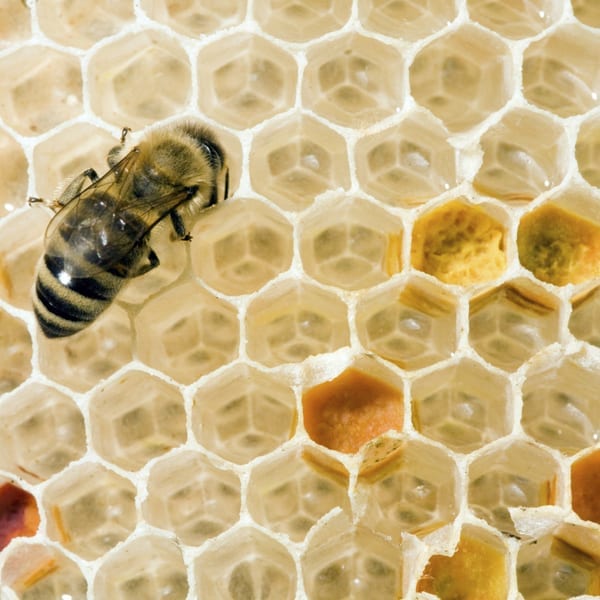Show me the honey
All over the UK, in town and country, ordinary people are becoming a part-time beekeepers. Hattie Ellis investigates this new hive of activity and learns how to get into beekeeping.

The buzz of bees on a warm summer day suggests that all is well with the world as the insects fly about gardens and parks, dipping into the nectar of flowers to turn it into fragrant honey. But honeybees have created another kind of buzz in the last few years because of their dwindling numbers. According to a University of Reading study, between 1985 and 2005 the number of honeybee colonies in England halved, with Scotland, Wales and Ireland also suffering major depletions.
Since then, honeybee populations have continued to decline, with disease and the rise of intensive agriculture (which decreases the number of wild flowers and plants) being blamed. Despite this struggling bee population, or perhaps because of it, there has recently been a surge of interest in beekeeping, and local beekeeping groups are inundated with people wanting to join courses. It’s not just that there’s a concern for their existence – there also seems to be a renewed fascination with the world of bees. And it’s easy to see why. Just look inside a thriving hive, watch a mass of up to 40,000 insects working together and then taste their fragrant honey – you’ll be hooked
What used to be seen as an old-fashioned pastime for older country-folk is undergoing a renewal, with younger enthusiasts, families and city dwellers getting involved. The British Beekeepers’ Association (BBKA), the main support organisation for this country’s beekeepers, has seen its membership increase by 25 per cent over the past year. So, what is the best way forward for the would-be apiarist?
For Richard Giacomo, a beekeeper for 18 months, the hobby was the next step on from being a keen gardener. His advice is to join a local beekeeping group, because “there’s an incredible amount to learn and, unlike gardening, if it goes wrong you have the responsibility for the bees”. Richard now helps look after 10 hives as part of HoneyWorks, an educational honeybee garden run by volunteers on an allotment in Hitchin, Hertfordshire. Despite the responsibility, beekeeping is a hobby that many can enjoy, he says. Richard is helped by his daughter Esme, aged 10, and son Isaac, aged eight, who both have their own bee suits.
Not everyone finds it essential to go on a beekeeping course (though the BBKA highly recommends that you do). Hannah Hodgson, a 31-year-old easyJet pilot, took up beekeeping a year ago, largely teaching herself from books, with the backing of her degree in zoology. She is now a member of Liverpool Beekeepers. “I’ve enjoyed it every step of the way,” she says; “knocking a hive together with glue and nails; going through the bees to find the queen; and seeing my bees flying on a spring day, knowing they’ve managed to come through the winter by keeping warm together.”
It is possible to be a beekeeper while leading a busy life. During the summer, you need to check your bees once a week or so for signs of swarming and keep an eye out for disease (these are the kinds of things you’ll learn on a beekeeping course). In the autumn, you may well need to feed your bees with a sugar syrup to replace the honey you have removed, or if your new colony hasn’t built up enough food over the summer to survive the winter. In the winter, you should generally leave them well alone until the bees are flying again when the weather warms up.
Setting up as a beekeeper costs anything between £400-800, depending on the equipment you invest in. The flowers’ nectar and pollen to feed the bees are free, though, and tasks such as taking the honey off the combs can be done with shared equipment in a beekeeping group. The main requirements are a hive, a good bee suit and basic equipment such as a smoker, which you puff over the bees to make them safer to work around (it makes them think there is an emergency, so that they fill up on honey and cannot bend their bodies to sting). The key advice is to buy only from trusted suppliers, especially if you are getting a second-hand hive. Bee diseases can live in the wooden walls and wreck your new colony.
Then comes the fun bit: getting your ‘nucleus’ of bees – the queen and 10,000-15,000 worker bees that will start off your colony. The advice here is to buy from an experienced bee-breeder who can help you get bees that suit your area and are friendly and disease-free.
Disease is a fact of life for the modern beekeeper and probably a large part of the cause of the crisis in bee numbers. The parasitic varroa mite, just visible to the naked eye, and the deadly American foulbrood (AFB) bacteria are two afflictions you’ll need to know about. Anyone with AFB must notify the government’s bee inspectors and the hive must be sterilised.
The other snag is that, sooner or later, you are going to get stung. If you get in the way of the bees’ flight path back into the hive or disturb them too much, then a bee’s got to do what a bee’s got to do. But these hazards are small in comparison to the benefits. For many, the honey is merely a delicious by-product and the main satisfaction is living alongside your bees. James Hamill, owner of The Hive Honey Shop in Clapham, southwest London, has been teaching newcomers on his summer weekend courses for 15 years. “After every course, people walk away with a great deal of awe and respect, and feel more calm,” he says. As well as providing sweetness, beekeeping can be a great antidote to the rush of modern life.
Hattie Ellis is the author of Sweetness & Light: the Mysterious History of the Honeybee.
Making a start…
There’s plenty in the way of resources available to the would-be beekeeper. Given the level of commitment involved in beekeeping, it’s important to find out all you can and consider the pros and cons first. The website of the British Beekeepers’ Association (
britishbee.org.uk
) is the obvious place to start. Their downloadable guides to beekeeping give a quick overview of what is involved and where to go to find out more. The website also lists its beekeeping courses held throughout the UK. Membership of the BBKA (and some local beekeeping associations) also gets you insurance, should any sticky situations arise. Many local councils and colleges also run beekeeping courses throughout the year.
For Londoners
The Hive Honey Shop (020 7924 6233;
thehivehoneyshop.co.uk
) in Clapham, southwest London, runs weekend courses in the summer, as does Urban Bees (
urbanbees.co.uk
), also based in south London.
If you don’t want to go the whole hog…
If you live in the capital, you can stick a tentative finger in the honey pot by hosting a beehive in your garden. Urban Bees (
urbanbees.co.uk
) acts as a matchmaker between hive owners with a lack of space and those with gardens who may be interested in becoming beekeepers. Hosting a beehive in your garden could be a good first step.
If you want to lend support to the nation’s beekeepers without donning a bee suit, the BBKA’s Adopt a Hive scheme (
adoptabeehive.co.uk
) might appeal. Those taking part don’t actually get a hive, but the annual fee means you get a year’s worth of info about bees and a link to a beekeeper in your area. The joining fee helps to raise funds for research into battling bee disease.
Trendy hive
Omlet, inventors of the contemporary Eglu chicken coop, have designed the equally desirable Beehaus, as well as gadgets such as a liquid smoke puffer, which is easier to use than traditional beekeeping kit. The Beehaus costs from £465. Visit
omlet.co.uk
.
Recommended books
- Bees at the Bottom of the Garden, by Alan Campion (£9.99; Northern Bee Books)
- Guide to Bees and Honey, by Ted Hooper (£12.99; Northern Bee Books)
-
Keeping Bees and Making Honey, by Alison Benjamin and Brian McCallum (£14.99; David & Charles)
Subscribe to our magazine
Food stories, skills and tested recipes, straight to your door... Enjoy 5 issues for just £5 with our special introductory offer.
Subscribe
Unleash your inner chef
Looking for inspiration? Receive the latest recipes with our newsletter